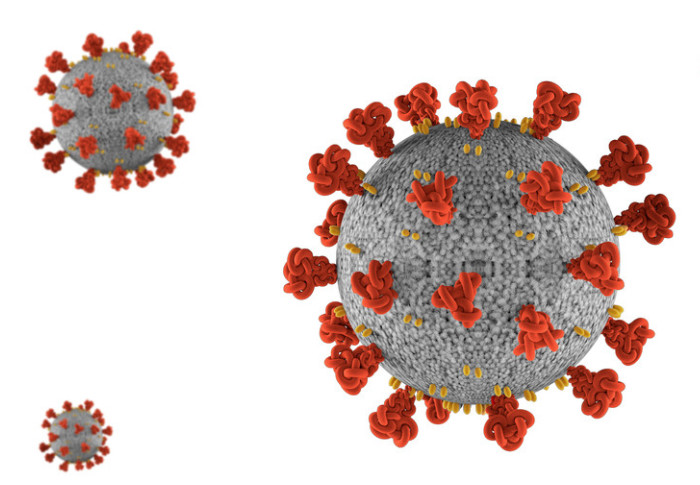COVID-19 and cancer insights revealed in new European study
by Ryan O'Hare

A large Imperial-led study has revealed valuable insights into the impact and risk factors for cancer patients with COVID-19.
The findings, from almost 900 cancer patients diagnosed with SARS-CoV-2 infection in the UK, Spain, Italy and Germany, highlight a number of key clinical insights, including:
- The average mortality rate among cancer patients with SARS-CoV-2 was 33.6%
- Patients who were male, older aged and had pre-existing conditions were more likely to have worse outcomes from COVID-19
- Continued chemotherapy and immunotherapy treatment had little impact on the severity of COVID-19, or survival rates
- The use of the antimalarial drug hydroxychloroquine appeared to have a beneficial effect in patients
- The UK had the highest mortality rates for cancer patients with COVID-19, as well as the highest incidence of hospital-based transmission of SARS-CoV-2.
According to the authors, the study provides evidence for using demographic factors to identify those cancer patients most at risk from COVID-19, so they can be further shielded. They add that there is also need for further research into emerging COVID-19 treatments in infected cancer patients, such as hydroxychloroquine.
Dr David Pinato, from the Department of Surgery & Cancer at Imperial College London and chief investigator of the study, said: “Since the early
Our findings show the UK has among the highest mortality rates for cancer patients with COVID-19 Dr David Pinato Study author
stages of the pandemic, cancer patients were identified as a high risk vulnerable group. In the UK, this has had an impact on access to cancer treatments. Clinicians had to make the difficult decisions to defer, modify or sometimes even withdraw active anti-cancer care due to concerns over safe delivery of treatment during the pandemic. Most of these recommendations have been guided so far by precautionary principle rather than solid evidence”.
“Our findings show the UK has among the highest mortality rates for cancer patients with COVID-19, as well as rates of hospital-based transmission of SARS-CoV-2, and suggests we should keep adapting our clinical services to minimise in-hospital transmission.”
“Our research also suggests the use of anti-cancer treatments such as chemotherapy and immunotherapy does not seem to increase mortality risk from COVID-19. This means that in many cases cancer treatment may be safe to use during the pandemic, depending on a patient’s individual circumstances and risk factors."
The findings were published recently in the journal Cancer Discovery.
Mortality rates
OnCovid was a multicentre study led by researchers at Imperial College London in collaboration with teams in Spain, Italy and Germany, to look at the outcomes from SARS-CoV-2 infection in European cancer patients.
Data were collected from a total of 890 cancer patients diagnosed with SARS-CoV-2 infection at sites since the early beginning of the pandemic. Patients had a range of cancers and the average time from first diagnosis of cancer to diagnosis of COVID-19 was 17 months, 56% were men and the average age was 68.
At the time of analysis (11th May), 299 patients had died (33.6%), 22 (2.5%) were ‘hospital survivors’ of COVID-19, and 569 (63.9%) were discharged from hospital.
Among the key findings were that the UK had the highest mortality rate at 44.4%, followed by 33.2% for Italy, and 29.6% for Spain – the sample size for Germany was just six patients.
Three-quarters of all patients had pre-existing conditions, the most prevalent being hypertension (43.4%), cardiovascular diseases (21.3%) and diabetes (20.3%), and close to half of patients total (46.2%) had more than one co-morbidity.
Older, male patients more likely to have worse outcomes
The majority of patients were treated on hospital ward (86.4%), but 14.5% of patients required more intensive care, and a proportion (13.6%) of patients were managed with self-isolation at home. Most patients (63.5%) developed at least one complication from COVID-19, the most common being acute respiratory failure, and increased numbers of complications were associated with increased mortality.
Older, male patients were more likely to have worse outcomes, and patients with breast cancer experienced the lowest mortality rates compared to other cancers.
According to the researchers, the findings suggest that looking at a range of patient characteristics and health histories in the clinic could help to stratify cancer patients based on risk, offering potential for more individualised treatment.
Anti-malarial drugs may reduce mortality
The team also assessed the impact of multiple novel drug treatments being trailed for COVID-19, including anti-virals, anti malarials (chloroquine / hydroxychloroquine) and the targeted anti-rheumatic drug tocilizumab.
Statistical analysis suggested exposure to anti-malarials alone was associated with a significant reduction in mortality from COVID-19, compared to patients who did not receive any anti-Covid-19 therapy.
Dr Pinato added: “Our findings around antimalarials were interesting and run contrary previous studies in cancer patients with COVID-19. We showed a net reduction in mortality from the exposure to hydroxychloroquine, which begs further investigation in this at-risk group. Further prospective research on this is particularly important given that the clinical value of antimalarials has been at the focus of intense debate due to the recent retraction of two studies that had suggested hydroxychloroquine might worsen mortality.
“Chiefly, this study highlights the clinical use of demographic factors for stratifying patients based on risk. But it also shows that more research is needed into emerging anti-COVID-19 therapeutics, like hydroxychloroquine, in SARS-Cov-2 infected cancer patients.”
-
‘Clinical portrait of the SARS-CoV-2 epidemic in European cancer patients’ by David Pinato et al. is published in the journal Cancer Discovery. DOI: 10.1158/2159-8290.CD-20-0773
Article text (excluding photos or graphics) © Imperial College London.
Photos and graphics subject to third party copyright used with permission or © Imperial College London.
Reporter
Ryan O'Hare
Communications Division